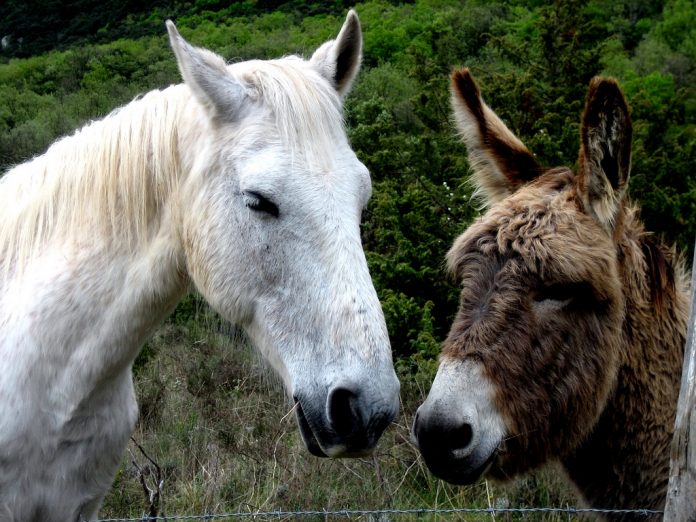An interesting fictional story on how changing the horse of a winning team to a donkey cost the team its very existence.
This could be the usual story in any of the Indian corporates. So, it will not be surprising if many of the readers can relate to the characters.
The story starts with Mohan, the boss. He has three people reporting to him – Akash to be referred as A, Biswas to be referred as B and Chivas, the C.
Mohan is a hard-working guy and is considered to be a good resource in the organisation. In order to accomplish his projects, he is quite dependent on his subordinates. His team members, who realise the same, also estimate their individual importance in the team and perform accordingly.
Let’s observe the performance and roles of these three team members.
A is an above average performer. He is high on energy and is always ready to take on newer challenges. He is highly ambitious, and for him the sky is the limit. A also happens to be an attention seeker, and Mohan, who is aware of this quality, uses it to his advantage. Mohan knows that A will perform any task, which will keep him in the limelight. In other words, A is like the dependable Hanuman in Mohan’s team, who will rescue him from any difficult situation.
B, on the other hand, is an average performer who does what is told. However, he will not go that extra mile to get the project completed. His peers consider him to be a performer, but not an initiator. He prefers to follow than to lead a team. As a team leader, Mohan certainly has faith in B’s capabilities, but knows where to draw the line and how much to rely on him.
C, the last one in the team, is a below average performer. He needs continuous guidance and support to accomplish any task. He is rated as a slow performer by his peers and colleagues.
Mohan realises that in order to keep the project going, he has to have someone to pitch in for C’s incompetence. He has only two options— use either A or B.
As evident, B is reluctant to perform that extra task because of his very nature, so in a way Mohan is left with only one option, that is A.
Since A is always keen to perform extra and is an avid initiator, he is more than happy to complete what C has left undone.
And things continue this way!
As time passes, Mohan starts assigning more work to A, even tasks which are not part of his KRA (Key Result Areas).
If earlier, A left his workplace at 8 pm, he now leaves at 10. However, this does not bother A. His bigger goal keeps him motivated. He expects a ‘superb’ rating at the end of the year, at the performance review.
Everything goes fine, till one day, an incident changes the entire ecological balance.
Incidence 1: It is a fine sunny morning of the 13th of October, 2013. C comes to Mohan and asks for seven days of leave for Dipawali. Mohan is quite generous and asks C to take three more days and increases his vacation to 10 days. What prompts Mohan to be so compassionate with an underperformer?
The reason is simple. Mohan does not consider C to be adding any value to the team. On the contrary, he is glad that C will be away for at least 10 days.
The outcome —both Mohan and C are happy.
Incidence 2: It is a not so fine morning of the 18th of October, 2013. A comes to Mohan and asks for six days of leave to attend his best friend’s wedding.
Mohan refuses to oblige. He fears for the project, deadlines et al. He says some nice words to A reminding him how important he is to the whole team and how his performance is the key driver for the project and also a great influence on the others.
Finally, A gives up his wish and nods in acceptance. However, A is not too happy with the outcome, and this is just the beginning.
The incident forces A to realise that in this team it is going to be difficult to be rewarded in a positive way.
He starts believing in the old saying – ‘The reward of good work is more work’.
The fact that he is unable to attend his best friend’s wedding keeps pinching him and the fact that C is sanctioned leave bothers him even more.
Finally, it is time for the annual review—time to be awarded for the hard work one has put in throughout the year.
Unfortunately, the organisation has decided not to grant any employee with the ‘superb’ rating that year. All team leaders are asked to rate their reportees with either ‘good’, ‘not so good’ or the last one – ‘perform or leave’.
Mohan is in a dilemma. He is a lenient boss and does not like to make anybody unhappy. So he does exactly what is expected of a lenient boss.
He decides to grade everyone at par with a ‘good’ rating assuming that it is confidential and none of his team members will learn about each other’s ratings.
Unfortunately, however, A learns about the ratings of B and C over a cup of coffee. He is shocked and shattered.
A is flabbergasted by the fact that despite so much of extra effort he is kept at par with B and C. He has not received the reward and applause he deserves.
This leads to a high level of dissatisfaction in A and finally, he exits the organisation.
Who is the ultimate loser?
The organisation, of course.
What about B and C? Are they affected too?
The answer is ‘yes’. B realises that in this team extra work will never be awarded and it is better to stick to his current way of working. He is not motivated to put in additional effort and continues to work in a relaxed way.
C also learns his share of the lesson. He realises that in this team ‘no work’ is rewarded with more leaves and eventually a ‘good’ rating as well.
He continues to be a leech in the team, sucking the blood of the organisation’s resources as well as money to grow further.

Lesson – What went terribly wrong in the entire scenario?
It was Mohan’s judgement and the way he handled his team. Though Mohan identified the horse of his team, he kept burdening him with more load and finally converted the horse into a donkey.
At the same time, he knew that he was unable to change the donkey in his team to a horse.
In the entire process, he went terribly wrong in rewarding the horse and considering him at the same level as the donkeys and ponies of the team!
This eventually resulted in the sad demise of what was actually a ‘winning team’. Amen!
One should remember – ‘A horse in the race will only be able to win, if he is fed properly.’
Who do you relate to? A, B or C ?
(The author is HR Manager at Godrej and Boyce.)
Value our content... contribute towards our growth. Even a small contribution a month would be of great help for us.
Since eight years, we have been serving the industry through daily news and stories. Our content is free for all and we plan to keep it that way.
Support HRKatha. Pay Here (All it takes is a minute)





































Hi Vivek,
You are indeed bang on … I could relate to this story so much .
Hi Vivek,
Your story says a lot, good lesson for all managers :}
Interesting Take on this Recurring Phenomenon ! Good Managers no only need to identify their horse but learn how to balance the load on the horse as well.
Nicely narrated the real incidences of corporate life in form of a story.
Good Job! Looking forward for your next article.
Vivek good story.. it happens all the time
Indeed, a write-up everyone can relate to. Good one.
Hi Vivek,
Story was very good and practically applicable. Really good one. Entire year boss knows the who is the horse and donkey but on appraisal day he wants to be saint and treats equally.
Regards,
Ravi
Hi Vivek,
Awesome … Indeed this is the scenario with most of the Org.
Hi Vivek,
A very good and real story indeed! This is a lesson for all to learn and implement at all levels in the organization. What we do not realise is the far reaching impact of the decisions in moulding lives of the people who have gone through this and who have witnessed it…very well written.
Very nice…
Dear Vivek
An appropriate example of today’s so called Leaders but the following decision of the Management has been fully ignored i.e.
“Unfortunately, the organisation has decided not to grant any employee with the ‘superb’ rating that year. All team leaders are asked to rate their reportees with either ‘good’, ‘not so good’ or the last one – ‘perform or leave’.”
The organisation should always keep in mind that there are only 20% employees who can be treated as ‘Fully Engaged” rest are Partially Engaged”, Partially Disengaged and Fully Disengaged.
Best of Luck
Hi Vivek,
I could relate to Mohan, and the three members A,B and C.
Also of the situation in plant no. double 1 😀
I was one of the ‘A’ till 2012
You may gave heard 😀
Dear All,
Thank you so much your valuable feedback and comments.
This surely will help me coming up with something new.
Regards,
Vivek Saha.
Very correct depiction of how self-motivating people add on burden on their backs without suitable reward..while even the non-performers make merry…
Amazing projection Vivek and awesomely drafted.
Superb Example of so called leader who is really incompetent to appraise the team members and also manage them in right way..Great..!
Dear Vivek
Really Superb. atleast after reading this post, people should change the attitude towards treating their team members..
There is always a group of 1/5th who really work and others are partially working and ‘act as working’ employees in any organisation, not only today even 40 years back too. It is also a fact that Management does not recognize this first group of 1/5th because they are there to work but always give priority to ‘act as working’ and partially working staff.
The case study presented is very good and had also circulated among my colleagues – Congrats to Mr. Vivek Saha.
Dear Mr. Nair,
Thank you so much for giving your perspective on my article.
Pareto principle (80-20 rule) is applicable in every team where 80% of the task is performed by 20% of the poeple in team. But, unfortunately while rewarding we divide the reward in equal parts and forget pareto principle.
A very interesting story to relate to respective work environments – we all come across horses and donkeys in various organisations (though rarely anyone ever would relate himself to being other than a horse…if there were indeed only horses – as most feel about themselves – where’re the donkeys ?).
Anyway, my comment is on something else here – the horse has not turned a donkey in this story…it is still a horse but now in another stable. Yes, if you are talking of the team led by Mohan here – it has indeed turned into a donkey ! But given Mohan’s managerial style of “Country Club”, or in the Theory Z model of Leadership style as Jolly Joe (1,9,1), the organization needs to be more worried about the likes of Mohan, than B or C. It takes a lot of moral courage and professionalism not to be a welfare oriented manager – a manager better say ‘No’ when he knows he ought to ! That is the essence of retaining and nurturing a happy mix of horses & mules (donkeys, in any case, do not deserve to be around !).
Dear Mr. Vivek,
very Apt story but organizations are changing and thats where quaterly evaluations and EBITDA based performance evaluations plays a vital role
Dear Manish,
Thank you so much for sharing your perspectives.
I completely agree with your viewpoint that Horses, if not treated well, will leave your Stable and Join another one. There are jockeys available in the Race-course to pay higher and grab the Winning horse for Leading the Race!
Regards,
Vivek Saha.
Good One
a practical example which one comes across in most work places. Hope the ‘Mohans’ out there realise to take proper care the horse in their team.
Hi Vivek , very well narrated the practical scenario.
I agree with your story however I also feel that In the scenario when A would have continued in the organization without knowing the rating of B & C eventually he would have got demotivated & probably left the organization because working with the team members who don’t bring anything to the table & if there is nothing to learn from other, it really becomes difficult.
Here role of Mohan is to take charge & differentiate between performance/potential & nonperformance so as to reward them accordingly, not equally.
It is said , People leave managers like Mohan not the organizations.
MS
Hey there I am so thrilled I f?und your website, I ?eally found
you b? accident, while I wa? browsing on Bing for som?thing ?lse, Any?ow I ?m
h?re now and would ?ust lik? t? say thank you for
a incredible post and a ?ll ?ound exciting blog (I
al?o love the theme/design), ? don’t have t?me t? ?ook ov?r it all at the mom?nt ?ut
I have book-marked ?t and ?lso included ?ou? RSS feeds, so ?hen I have t?me I w?ll be b?ck to read mo?e, Please do ?eep up the great job.
Take a look at my website … betwayn – betwayn.com,